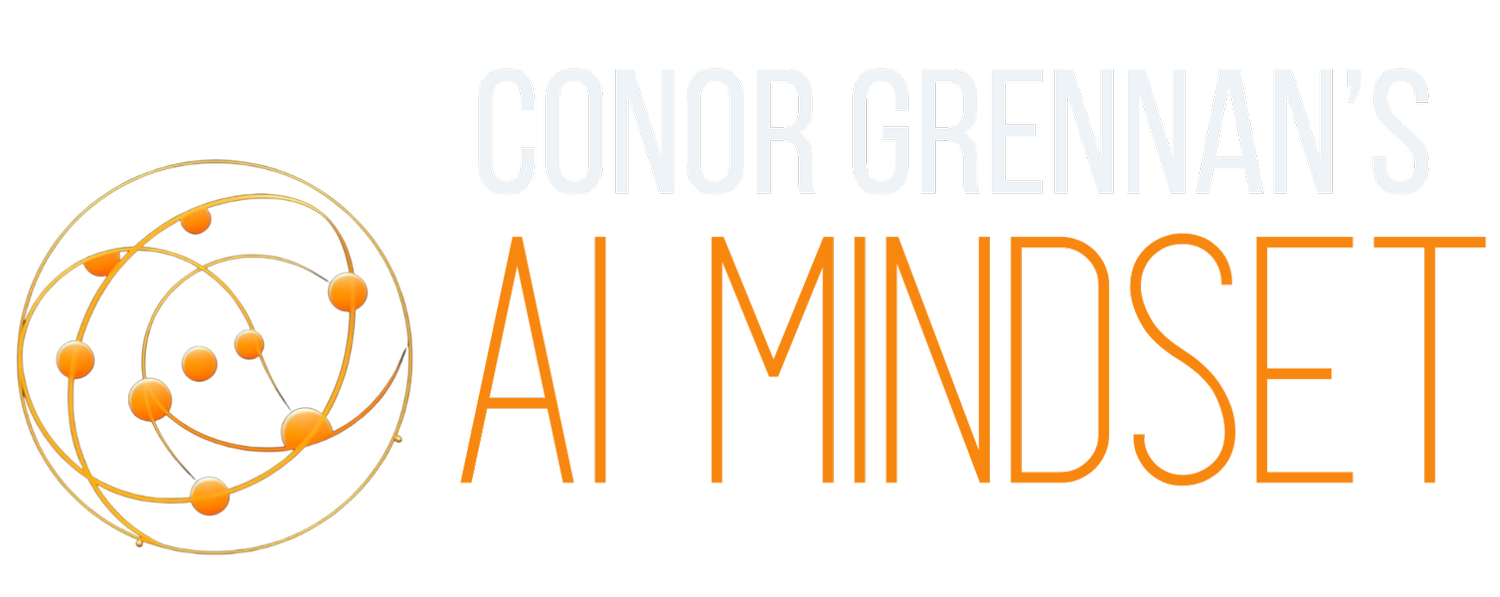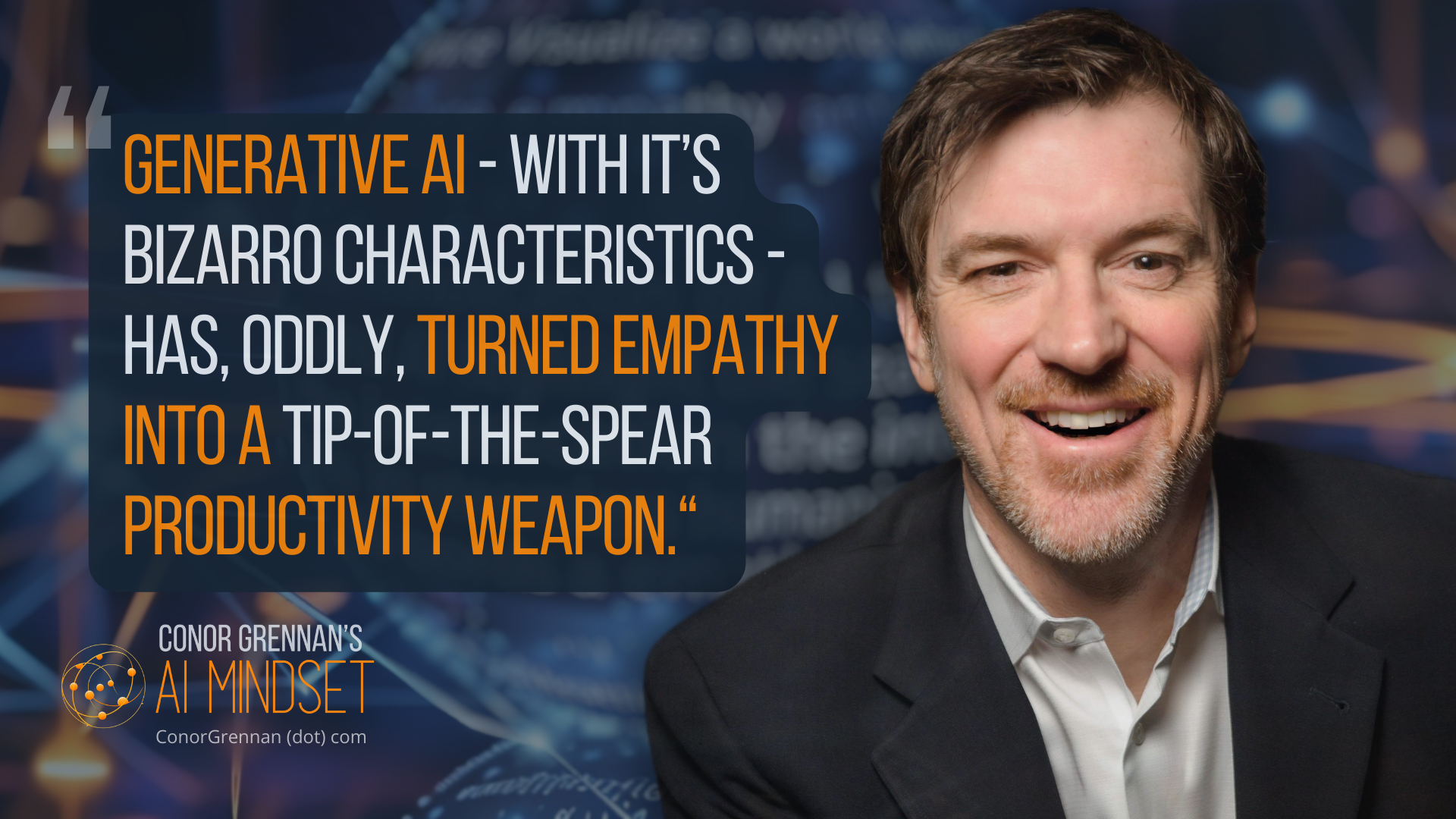The future belongs to English Majors
Ready for an epic plot twist?
Empathy will rule in a world of generative AI.
And I don’t mean in a “People-Should-Be-Nicer!” way.
I mean in a literal, “Crush-the-Competition” way.
Generative AI - with its bizarro characteristics - has, oddly, turned empathy into a tip-of-the-spear productivity weapon.
That means if you are good at communication, relationship-building, leading…you have a powerful advantage.
Let’s talk about:
Why that’s the case and How to leverage those skills.
Why Soft Skills Are Actually Hard Skills with Generative AI
Generative AI like ChatGPT is, quite simply, software that does not behave like software.
It behaves like a human. (I say ‘behaves’, not ‘is’. Don’t get on my case.)
That’s different from any software - or even tech - in history. It’s the stuff of science fiction.
ChatGPT behaves less like Google and more like Jarvis (Iron Man) or Dave (2001) or Samantha (Her) or TARS (Interstellar).
You don’t need to be a coder to interact with those entities.
You only need:
1) Natural language and
2) To know what you want to get done.
This is where we my English major friends will thrive.
But don’t take my word for it.
Let’s hear from the experts themselves…
Christopher Pissarides, Nobel Prize-winning market economist at London School of Economics had this to say.
To quote the Bloomberg article,
[Pissarides] has cautioned younger generations against piling into studying science, technology, engineering, and mathematics (STEM) subjects, saying that “empathetic” and creative skills may thrive in a world dominated by artificial intelligence.
Or how about what Matt Candy at IBM said in Forbes Magazine:
Matt Candy, global managing partner in generative AI at IBM Consulting, believes the jobs of the future will be filled by those who can work with AI using language and creative thinking nurtured in liberal arts degrees.
Or Wharton Professor Ethan Mollick, who writes the popular newsletter One Useful Thing and is a leader in the genAI space, has written…
“Prompting may be programming, of a sort, but it can also be thought of as teaching or managing the LLM. And the humanities can help you be a better prompter.”
Okay, enough of those guys - back to me.
I’ve heard from one prestigious universities that they are strongly encouraging incoming STEM majors to double major with humanities for this very reason.
This is not just the future. This is happening right now. So….
How do we leverage our skills to
master generative AI?
“All well and good,” you’re thinking. “But how do I actually use my skills?”
Great question.
This is what I teach in my AI Mindset Framework:
The only thing holding you back from super-charging your workday and career is…
Your (annoying) brain.
Let’s get tactical.
STEP ONE:
First, consider WHY your empathy and communication skills are valuable to an organization. The answer? Because they make you an excellent leader of people.
That means that if you have a super bright young intern working for you, your skill set allows you to get the most out of them. You aren’t just barking instructions and walking away.
Instead…
You are clear in your instructions.
You are patient as they learn.
You provide instant helpful feedback.
You provide examples of good work.
You encourage them to take a deep breath, think through the task step by step.
These traits tend to bring out the best in others.
Because ChatGPT behaves like a human, these traits lead to outstanding prompting. That’s not some hot take - that’s what OpenAI tells us.
Step two
You have the potential to master generative AI
over folks who do not have these traits.
BUT.
Your annoying brain gets in the way.
That’s because your brain has a hard time looking at a computer screen and seeing an intern. Your brain, with its neural pathways, has already automated the fact that a text box must be akin to Google. So you talk to it like Google.
Moreover, this is all subconscious. Just like if you see a puppy, you instinctively talk to it in your who’s-a-good-boy voice and not my-most-important-client-just-walked-in voice.
So you need, quite literally, a new mindset.
You need to start talking to ChatGPT as if it was a human. I talk about some tactics in my HTG Principle video. You have to trick your own brain.
It takes work. But the results are extraordinary.
We can do this together, friends.
AI NEWS OF THE WEEK
Google’s Comeback?
Google has been losing big to OpenAI in the LLM wars. Can the release of Gemini 1.5, right on the heels of 1.0, make up that ground? Sundar Pichai, the CEO, is sounding cool and confident.
OpenAI Gets a Memory
Using ChatGPT can feel like talking to a brilliant intern with amnesia. But OpenAI announced new capabilities that will allow ChatGPT to remember you and relevant details. This could be big.Super Bowl Tells the Story of AI
The Super Bowl ad lineup tells us what everyone is thinking. Some great ones making fun of AI images. For me, the MS Copilot and Google ads showed how AI will transform our lives really hit home.
GENERATIVE AI TIPS
One of my go-to tricks with ChatGPT?
Turning it into an IT wizard.
Make sure you're upgraded to ChatGPT Plus for the full experience, especially for the Vision feature - it's a game-changer for troubleshooting.
Stumped by a tech glitch?
Just snap a picture using Vision,
ask ChatGPT for help, and watch as it conjures up a solution.
Struggling with setting up those audio inputs in GarageBand?
No sweat. Capture a screenshot, spell out your dilemma, and ChatGPT will walk you through a step-by-step magic spell to fix it.
That’s all for today!
Curious to hear your thoughts - what hit the mark, what missed, and hey, are you into the orange and blue duo as much as I am? There's something about that color scheme that just clicks, right? UVA, Knicks, Mets, and of course, the AI Mindset vibe.
Send this to folks who might find it useful, knock on doors to demand people subscribe, whatever you need to do. We gotta level up together, friends!
See you next time!









